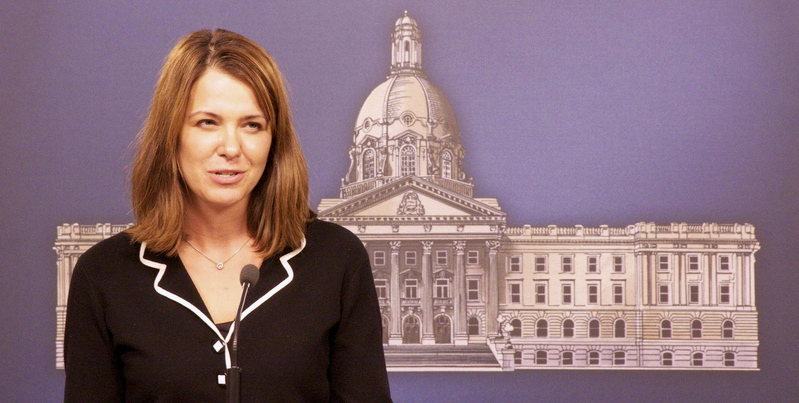EspañolDanielle Smith has, in her own words, “always been involved in the world of ideas” — an advocate for economic liberalism with the Fraser Institute and then with the Canadian Federation of Independent Business. So when she decided to enter Alberta’s political arena, sparks were inevitable, as were a new crop of ideological enemies.
Smith, out of office as of this month, shared an interview with the PanAm Post, to reflect on whether the venture was worth it, and on how others of her inclination might engage in an effective manner.
She explains that within the advocacy realm one is always working indirectly to advance the ideas into policy, be that via public opinion or lobbying those in office: “Maybe I got frustrated; maybe I got impatient. I felt like it would be better to see whether or not [the ideas] could be implemented through the political process.”
In this quest, she joined the upstart Wildrose Party (named after the province’s official flower) and became its leader in 2009. The rogue party conveyed her desire to oust the Progressive Conservatives (PCs), who had held power for decades and, despite pleadings to the contrary, were anything but for limited government.
Regarding how the PCs became so unpopular in Alberta, Smith actually defends their former Premier Ralph Klein (1992-2006): he “came in having inherited a major mess of a CAN$23 billion debt … an amount of money that was cannibalizing [program expenditures].” He balanced the province’s budget, paid off the debt, and streamlined the regulatory environment, without raising taxes.
However, “it’s like he didn’t know what to do next, and as a result the [progressive] drift set in.” Resource revenues, which proved to be unsustainable, enabled both expanded program spending and lower taxes during and after Klein’s time in office.
“We’ve had 10 years of government that was not principle based … It was just ‘let’s do whatever it takes to stay in power’ … There’s been a bit of a shell game going on.… It all came to a crashing end … and we were left with a completely unsustainable situation, with the lowest tax structure in the country and the highest cost of public service.”
As this storm was brewing — with the writing already on the wall — Smith and other Wildrose Party members rode the wave of popular discontent with the PCs and soon became the official opposition. But that still fell short of her goal, since it was “another indirect way of trying to press for public-policy ideas.”

Not only was she struggling to have the impact she desired, she found herself increasingly disillusioned with the Wildrose, and less optimistic about party expansion: “The challenge that we got into in the Wildrose is that part of our coalition involved some fairly strident social-conservative voices on moral issues, on issues of traditional family values … and gay rights.”
“I began to get quite worried that we were going to see the opposite of what I’d hoped [for] … we’d now have two conservative parties splitting the vote on the right ideas, and then you would end up with a progressive party coming up on the other side.”
Late in 2014, Smith thus made the final decision to leave the Wildrose and join the PCs, earning plenty of consternation along the way. Her move came to naught, though, as she failed to win her party candidacy in Highwood and support for the PCs collapsed, much of it going to the Wildrose.
Her fear is precisely what happened in April’s provincial elections, earlier than Smith expected, with the New Democratic Party (NDP) crushing both the PCs and the Wildrose. The NDP went from just four to 53 seats, achieving a comfortable majority of the 87 available seats. Such a landslide, she explains, compels a “galvanizing vision” in response, one that addresses matters of social justice and the most vulnerable.
“If that fractured vote does not come back together … around conservative principles that members of both parties can support, then I think that we’re in line for a New Democratic government for two election cycles, three election cycles, maybe longer. Alberta is known for dynastic governments.”
Although Smith still believes Wildrose was necessary, to wake the PCs up, it hardly worked out as she’d planned. She is also much more aware of the limits on elected officials, even when they are in government.
“I joined the PC caucus for four months, and there were even just some tiny issues that I was trying to get a decision on … certain things that should have been no-brainers, and [the effort] was ultimately not successful.… Even when you get a majority government, there are limitations in what the bureaucracy will allow you to do.”
Smith now plans to return to the charitable and advocacy sectors, “a better fit with [her] ideology, but also a better fit with being able to create the conditions for social change.”
She cautions idealistic people about the nature of politics, since it is a “process of building coalitions of individuals to be able to get enough people agreeing on enough things [so] that you can win enough seats to be able to implement some of your agenda.… That process, by its very nature, involves compromises.”
In fact, she believes even more strongly in the value of ideas: “the most effective way to get the government to be pressured into making a change is to have a groundswell of public opinion, a groundswell of support.”
Further, she is not going to wait around for government to change or support pet projects: “My experience has been that the social agencies that are the most effective are the ones that have the least amount of government money, the ones that have the most individual support, the most community support.”
 Versión Español
Versión Español












